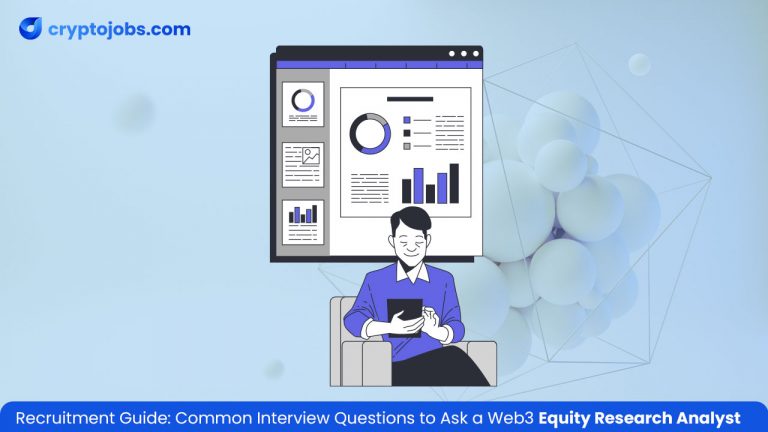
Common Interview Questions to Ask a Web3 Equity Research Analyst
- cryptojobs.com
- June 13, 2024
- All Posts, Interview Questions
- Web3
- 0 Comments
Equity Research Analysts are becoming increasingly important in the Web3 industry. The combination of blockchain and decentralized finance (DeFi) has changed the equity research landscape. Due to this, companies have to be careful about who they hire. Hiring managers now ask a sophisticated set of interview questions that are designed to gauge applicants.
Recruiters use these questions as a tactical tool to find top talent who can succeed in this niche industry. These interview questions may be used to evaluate technical proficiency in blockchain protocols or analytical aptitude in decentralized ecosystems.
This guide examines carefully chosen common interview questions intended to assess candidates’ skills and aptitude as Web3 Equity Research Analysts. If you are a recruiter or a hiring manager, consider asking the below-mentioned questions to find the best candidate for your company.
Are you a talented professional looking to find your dream equity research job in the Web3 industry? Look no further; register with cryptojobs.com today to find the most sought-after opportunities.
A competent applicant for the role of Web3 equities Research Analyst would be aware of the components that make up a successful equities research report. They ought to emphasize:
Industry Overview: Applicants should be aware of current developments in the industry and how they affect the business.
Finances and Ratios: Have knowledge of the analysis of financial indicators such as market share, liquidity, solvency, and sales turnover.
Valuations and Projections: Must have the capacity to predict share prices in the future by analyzing their financial performance.
Recommendations: Applicants must support their buy, sell, or hold suggestions with thorough research.
Recruiters should give special consideration to applicants who show a solid grasp of these elements and who can clearly explain how they would successfully incorporate them into their equity research reports.
Strong applicants for Web3 equity research analyst positions should be able to define and clarify enterprise value and equity value in addition to making the distinction between the two. They should emphasize the importance of enterprise value in evaluating a company’s financial health for both debt and equity investors by defining it as the overall worth of a company’s operating assets, including debt and stock, less cash, and cash equivalents.
On the other hand, the entire value attributable to equity shareholders should be determined by deducting the earnings from convertible securities and stock options from market capitalization. This is known as equity value. Applicants must stress how crucial it is to assess future business results and shareholder profits. A qualified applicant will stress that although enterprise value offers an all-encompassing perspective of a business’s value, including debt, equity value focuses solely on the value available to equity shareholders.
Proficiency in fundamental financial statistics is a must for a prospective Web3 Equity Research Analyst position in order to assess a company’s performance. Look for candidates who know about:
Liquidity Ratios: Current Ratio, Quick Ratio, and Cash Ratio.
Turnover Ratios: Receivables Turnover, Inventory Turnover, and Accounts Payable Turnover.
Operating Efficiency Ratios: Asset Turnover Ratio and Equity Turnover.
Operating Profitability Ratios: Gross Profit Margin, Operating Profit Margin, and Return on Equity.
Business Risk: Operating Leverage and Financial Leverage.
Financial Risk: Leverage Ratio, Debt to Equity Ratio, and Interest Coverage Ratio.
A potential applicant for the role of Web3 equity research analyst ought to describe their systematic process of building a financial model. Look for candidates who know about:
Getting Historical Data: Compiling and examining previous financial accounts of the business.
Creating Assumptions: Developing logical hypotheses based on in-depth analysis and industry expertise.
Financial Statement Forecasting: Estimating future cash flow, balance sheet, and income statement data.
Valuation Analysis: Determining the intrinsic worth of the business by applying valuation techniques like discounted cash flow (DCF).
Justification Of Assumptions: Exhibiting the capacity to defend choices and presumptions made inside the model.
A proficient applicant for a Web3 equity research analyst position ought to comprehend financial modeling as the methodical procedure of forecasting an organization’s future financials. They should stress how useful it is for planning and arranging financial statements, such as income, cash flow, and balance sheets.
Candidates should also emphasize how financial modeling helps understand key elements of a business, like ratios, debt levels, and profits per share, which are crucial for investment and valuation choices. They ought to emphasize how important it is to project future financial performance using past data to foresee possible trends and difficulties. Furthermore, applicants can demonstrate the usefulness of financial modeling approaches by showcasing their expertise with real-world instances of financial models, such as those for initial public offerings (IPOs) or well-established businesses like Alibaba.
Hiring managers looking for exceptional candidates for Web3 equity research analyst and other equity research analyst jobs, take note! Use cryptojobs.com to discover knowledgeable experts prepared to handle the intricacies of Web3 technologies and transform equity research. Join us now to get in touch with applicants who have the know-how and drive to succeed in the ever-changing blockchain and cryptocurrency industries.




